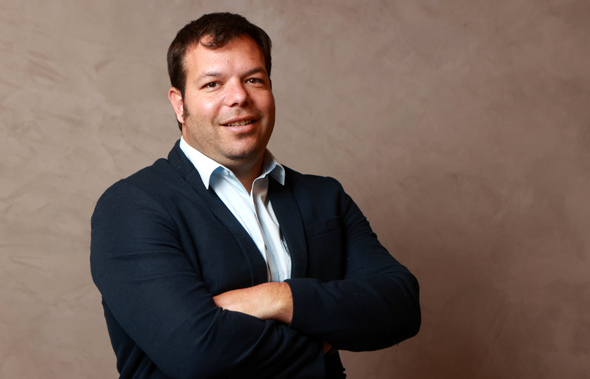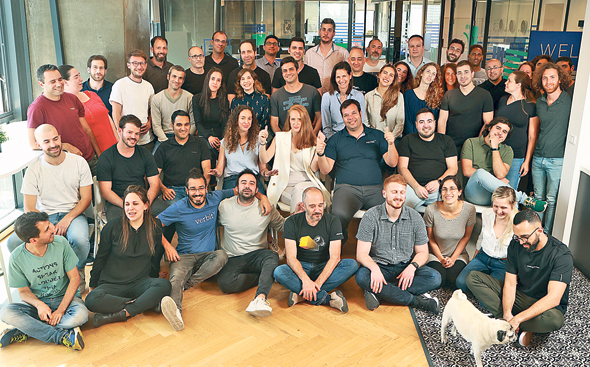The 50 Startups List
Verbit’s technology leaves it alone at the top of the transcription world
“I identified the problem in 2011, found the solution in 2016, and today we are leading the market,” says CEO Tom Livne, whose company was ranked third on Calcalist's list of 50 most promising Israeli startups
The idea for transcription technology , which landed in in second place in Calcalist's 2021 list of 50 most promising Israeli startups, came to Verbit’s founder Tom Livne when he was working as a lawyer: “we would switch vendors every few months and I found myself quite often sitting down to fix transcripts myself. I asked myself how is it possible that in this digital age, so much of this is still being done manually. As an entrepreneur, you’re always searching for problems and potential solutions. After I began researching the market, I realized that it’s a huge one and that legal transcription is only one facet among many. I recognized a massive opportunity for technological disruption and the absence of a clear market leader. My vision was to build something huge. Today, four years later, we are the largest transcription technology platform in the world.”
 Verbit founder Tom Livne. Photo: Amit Shaal
Verbit founder Tom Livne. Photo: Amit Shaal
You founded the company despite not having a background in technology. How did you know that such a product could even be developed?
“I first encountered the problem in 2011, tried out the voice recognition technologies that were available at the time, and realized that they were not yet good enough. I continued keeping tabs on the industry and in 2016, with the transition to the cloud and the explosion of machine learning, it was already possible to upload an audio file and have it transcribed relatively easily. I identified a noticeable improvement at the end of 2016 and thought it was a good time to develop a product, with the technology to support it already in existence. At the same time, the rise of the marketplace model, with companies like Uber showing up, enabled me to hire transcribers all over the world.”
Nowadays there is no shortage of transcription software in the market; even Google and Microsoft offer such capabilities embedded in their products. But, as is evident in the case of Google Translate, a program that is designed to provide as wide as possible service to an immense range of users faces difficulty when it comes to answering professional-grade needs. Verbit realized that there are several fields in which the need for conversation transcriptions is acute and the work is currently still being done by slow and expensive human transcribers. The company’s technology is based on artificial intelligence, which is highly trained to identify terms and contexts in specific fields.
Today, Verbit is the undisputed leader in its field. Its main competitors are non-technological in their essence and their solutions can’t compare to the capabilities of AI, which itself is constantly improving.
You are in a unique position being a company whose technology has no real competition.
“There is a lot of competition, more than 5,000 transcription companies, but the people who lead them spent 20 years building up a client base and have no ambition to grow or raise money from venture capital funds. They still do everything manually, so part of Verbit’s vision is to provide them with an exit strategy. We have already acquired several such companies.”
 Verbit's team. Photo: Amit Shaal
Verbit's team. Photo: Amit Shaal Competition is often what spurs technology companies onwards — your competitor comes out with a new feature, which forces you to respond. You don’t have that going for you.
“We aspire to expand and innovate. We are currently active across three verticals and there are 10 more examples of new verticals, new languages, and new locations. Other sectors we want to get into, for example, are insurance, government, healthcare, and defense. Each one of them requires product adjustment.
“In the legal sector, for example, we are experiencing natural client growth while having to carry out marketing activities. When asked how we can maintain it, we realized that while we’re transcribing all the texts, we can offer our clients additional capabilities: if, for example, a person testifies in court and a week later contradicts what they said previously, we can point out that contradiction to our clients.
Naturally, Covid-19 increased demand for the company’s products. In the education world, for example, the switch to remote learning emphasized the need for transcribing lectures. In order to increase its capabilities and its number of media clients, Verbit recently acquired a traditional transcription company and onboarded its clients, a move that instantly made Verbit one of the world’s leading captioning providers. The company aims to carry out further acquisitions and even employs a team whose sole job is to identify potential targets and ease their integration into the company.



